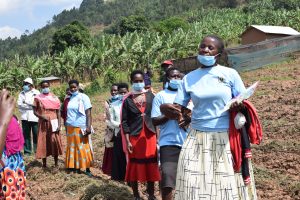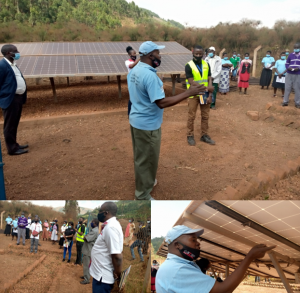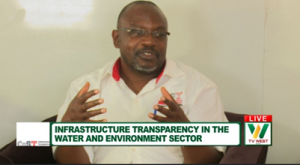
In the farming communities of Mabira and Nyamihanga in Uganda, the start of the dry season brings with it lower production levels for farmers, impacting on their take-home pay and food supply for families. Agricultural production plays a key role in the local economies of both localities: in Mabira, this is centred around cattle rearing and growing banana crops, whilst in Nyamihanga – located in one of the major ‘bread baskets’ of the country – farmers grow a variety of vegetables including potatoes, cabbages and aubergines. Lack of access to water during the dry season had critical impact on the viability of crops and wellbeing of livestock.
To maintain production levels, the Ministry of Water and Environment has been extending water supply to farmers through infrastructure projects across both communities to ensure land and livestock can thrive all year round: in Mabira, through the reconstruction of a dam and in Nyamihanga, through the implementation of a solar-powered irrigation scheme. However, project implementation has not been plain sailing and a lack of stakeholder engagement impacted the maintenance and efficacy of both projects delivered.
In order to resolve these issues, CoST Uganda built on its past success of holding community engagement meetings called ‘barazas’ to establish a platform for public officials to engage with residents and other local stakeholders. The outcome of the barazas has meant that both projects are better maintained, residents are aware of their intended use and the government has agreed to extend water supply to a further 200 farmers, meaning they too will be able to maintain their livelihoods throughout future dry seasons.
CoST assurance brings shortcomings in project implementation to light

The Mabira Dam and Nyamihanga solar-powered irrigation scheme were included in CoST Uganda’s third assurance report, an independent review of disclosed data from 13 infrastructure projects across sectors ranging from health and education to environment and energy. While the assurance process showed improving levels of citizen engagement by the Ministry of Water and Environment, it also showed that efforts to engage other stakeholders, such as the local governments of Mbarara and Rukiga, were limited. Buy-in from these bodies is critical to the long-term success of both projects, as local authorities are ultimately responsible for their supervision, maintenance, ownership and management. A lack of engagement therefore ran the risk of poor project maintenance further down the line, with direct impact on farmers’ livelihoods as a result.
The assurance report also revealed that citizen engagement, whilst improving, was focussed on the initial stages of project delivery. Furthermore, key information about how farmers could access the water supply was circulated to only a small group, meaning that many farmers missed the opportunity to access water for production.
Barazas offer space for debate and opportunity for change
To plug some of the gaps in communication revealed through the assurance processes, CoST Uganda recommended that the Ministry of Water and Environment bring stakeholders together at barazas. These events bring together those responsible for project delivery such as government officials, contractors and engineers with families and business owners that the projects are designed to benefit. Facilitated by CoST Uganda, they provide an opportunity for community members to ask questions, air grievances and establish key information about the projects being implemented locally.
 Citizens speak out
Citizens speak out
Over 160 people came together at the two CoST barazas held in Mabira and Nyamihanga, adhering to Covid-19 measures to safely discuss key issues impacting the communities. Attendees were drawn from a wide group across society with farmers, business owners, religious leaders and journalists in attendance. They provided a critical opportunity for issues to be raised, with firm commitments made from the government as a result.
Extending access to critical water supply
Given the importance of water supply to both communities, a key message from citizens at both barazas was the need for the water supplied through the dam and irrigation scheme to be extended to more farmers.
Those who had access to water in Nyamihanga outlined how their crop yield had increased, meaning they were able to extend their plots and increase their income as a result. This had a knock-on effect on tax revenues within the local area, meaning more investment in local health, social and infrastructure services. There has also been an increase in employment, with one farmer in Nyamihanga outlining how he hired an additional 20 workers from the community on his farms as a result of the irrigation scheme.
Drought often impacted our community and reduced our production levels. Before the irrigation scheme was put in place my farmland was small, however I have expanded my plot and increased my produce to include passionfruit and vegetables. Although the irrigation is currently too small to meet the needs of all farmers, we have managed to access fresh food in the dry spell and increase our savings.
Lead farmer in Nyamihanga
In Mabira, drinking areas around the dam provide an ongoing water-source for cattle reared in the area, and the banana plantations now have year-round irrigation, meaning farmers have seen a similar increase in produce and revenue.
An issue which came to light in Nyamihanga was that communication around gaining access to the irrigation scheme had, at times, been weak. As such, community members were unaware that – due to the high cost of extending water supply on an individual basis – applications to gain access to the scheme could only be made as a group. The Ministry of Water and Environment therefore used the Nyamihanga baraza to encourage more farmers to form groups in order to submit joint applications. The baraza was an opportunity to communicate vital project information such as this, which will mean its benefits are felt more widely in the future.
Meanwhile in Mabira, citizens used the platform offered through the baraza to request that the Ministry extend water further within the community. This led to a firm commitment from the government to extend water across an additional 12 acres of land, covering 200 farmers in total, by 2025. Once this is done, the benefits recounted by farmers in increased production, employment and income will be felt by communities across these 12 acres.
The project is very good, but so far few farmers have benefitted from it. Since the water is close to our health centre which does not have water, we also request that water is extended to the community health centre
A citizen speaks out at the Mabira Dam baraza
Improved communication strengthens environmental protection

While irrigation provides critical water supply during the dry season, these projects have a direct impact on their surroundings which make Environmental Impact Assessments (EIAs) particularly important. A key issue raised during the Mabira dam baraza was that the government had failed to work effectively with the local authority throughout project implementation and had not disclosed findings of the project’s EIA. This meant Mabira district’s Environmental Officer could not establish whether an EIA had been approved and whether the government had an environmental certificate – an important tool to monitor the levels of environmental protection around projects. As a result of concerns raised at the baraza from the local authority, the Ministry agreed to submit all relevant documentation and guidance on how environmental risks would be mitigated. CoST Uganda will monitor the disclosure of this information to ensure it is published and any necessary mitigation measures are taken.

Working to ensure long-term commitments are met
While Covid-19 brought with it a unique set of challenges, this experience illustrates how stakeholders can nonetheless come together to strengthen social accountability, communication and engagement around project delivery. To heighten the impact of the barazas beyond the immediate communities of Mabira and Nyamihanga, CoST Uganda have been carrying out a media campaign to publicise the key findings. The team will now work with government officials to ensure that commitments made at both barazas are met, and that local communities continue to feel the benefits of both important water projects.
Download the full impact story here.